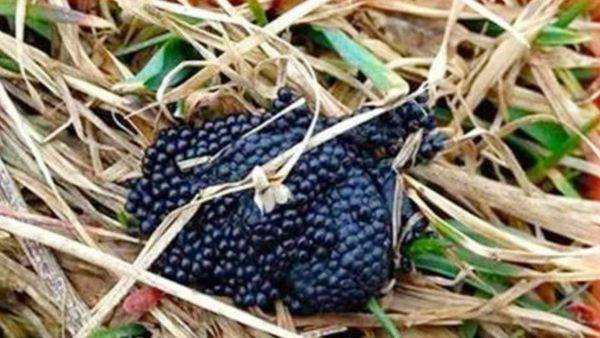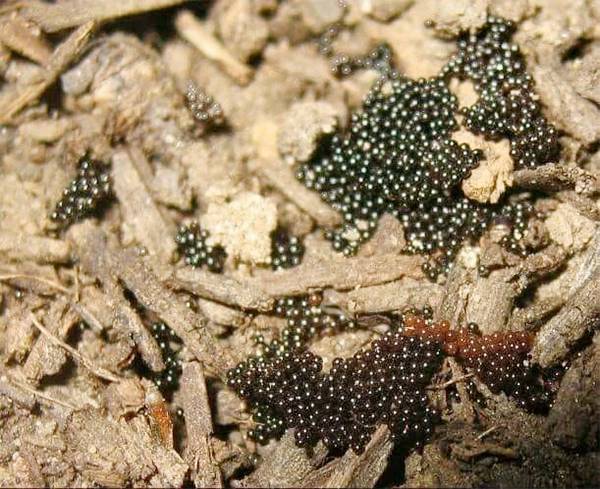These small, glistening masses often go unnoticed, hiding beneath grass, on low plants, or along fence lines. What appears to be a minor curiosity can quickly turn into a major infestation capable of spreading well-known tick-borne diseases. Homeowners who overlook these early warning signs may unintentionally expose their households to avoidable risks. Understanding what these eggs look like, why they matter, and how to respond is essential for maintaining a safe, pest-free outdoor environment.
What tick eggs look like in your backyard

A single female tick can lay up to 3,000 eggs at once, meaning even one cluster can quickly lead to a large outbreak. Homeowners searching for signs of tick activity should pay close attention to damp areas, overgrown grass, and hidden corners where ticks thrive. Identifying these eggs early is one of the best ways to prevent a rapid expansion of tick populations around your home.
Why tick eggs are a serious hidden danger
Ticks are far more than a backyard nuisance. They are notorious carriers of diseases such as Lyme disease, Ehrlichiosis, and Rocky Mountain Spotted Fever. When these pests emerge from egg clusters, they begin seeking hosts immediately, increasing the risk of tick bites for humans and pets. Beyond the health risks, a severe infestation can also create indirect financial consequences. Some home insurance providers consider tick-related risks when evaluating coverage, especially if pest problems lead to medical issues or require extensive outdoor treatments. A yard filled with ticks can reduce property appeal, impact resale value, and force homeowners to pay for urgent pest control measures. Treating tick eggs like a minor issue can result in major problems later.
Immediate steps to take if you find suspicious egg clusters
If you notice small clusters that resemble tick eggs, it’s essential not to touch or disturb them. Crushing them can release larvae and spread the problem. Instead, homeowners should begin by taking clear photos for professional identification. Contacting a licensed pest control service is the safest next step, as experts use EPA-approved treatments that target eggs, larvae, and adult ticks without harming soil quality or beneficial insects. Until professionals assess the area, keep children and pets far from the affected spot. It’s also wise to review your home insurance policy to see whether pest-related health risks or treatments are covered. Acting quickly keeps the infestation from escalating and protects your household from preventable exposure.
Expert-recommended ways to prevent tick infestations
Preventing tick infestations is easier than managing them after they’ve begun. Experts consistently recommend maintaining a tidy yard by trimming grass, clearing leaf litter, and removing brush piles where ticks hide. Creating gravel or stone borders between your lawn and wooded areas helps deter tick movement into your yard.

Avoid planting vegetation that attracts deer — such as hostas, azaleas, and daylilies — since deer frequently carry ticks. Instead, incorporate natural repellents like mint, rosemary, and chrysanthemums to discourage pests. If you have pets, consistent veterinarian-approved tick protection is essential. Many homeowners also benefit from annual pest control plans, which may even qualify for certain tax deductions depending on maintenance categories. Long-term prevention not only reduces infestations but also lowers home maintenance costs.
Protecting your family and property from long-term risks
Your backyard should be a safe and enjoyable space, not a hidden source of health problems or financial strain. Identifying tick eggs early is one of the most effective ways to protect your home, pets, and loved ones.

Because ticks reproduce quickly and thrive in unnoticed corners of your yard, delaying action can turn a manageable issue into an expensive and hazardous infestation. Homeowners who take proactive steps — from professional pest inspections to consistent yard maintenance — experience fewer pest problems and enjoy greater peace of mind. Staying vigilant, making informed decisions, and understanding the risks behind tick eggs will help keep your property safe year-round.












Yorumlar
Kalan Karakter: